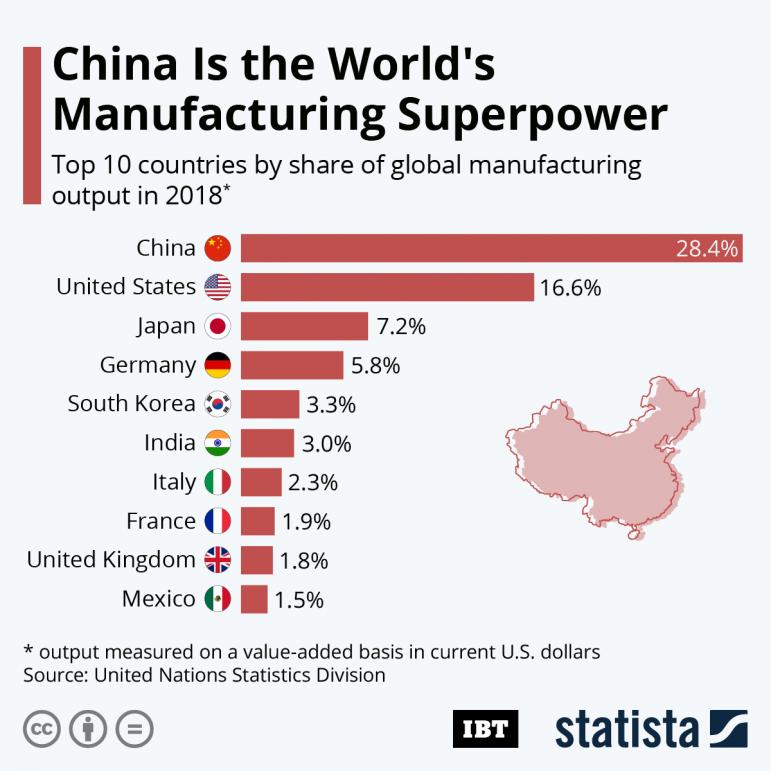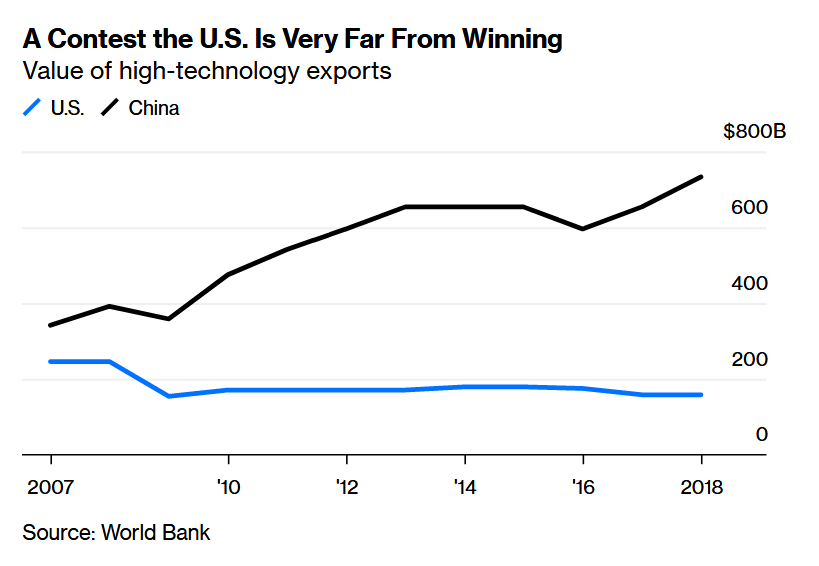While reading this
, I found this interesting and fascinating tidbit:
However there may be several interesting scenarios as to how this plays out in the coming decade, and I have four different scenarios for how/when China's GDP can overtake that of the US's: (1) low-baseline growth, low RMB appreciation against USD, (2) low-baseline growth, high RMB appreciation against USD, (3) high-baseline growth, low RMB appreciation against USD, and (4) high-baseline growth, high RMB appreciation against the USD.
TLDR:
Scenario (1)-
2030
Scenario (2)-
2026
Scenario (3)-
2028
Scenario (4)-
2025
Let's get into the nitty-gritty:
For Scenario (1) of
low-baseline growth, low RMB appreciation against USD, lets presume GDP Growth Rates between China vs US are as follows for the 2020-29 Decade:
| Year | China GDP Nominal Growth Rate (%) | US GDP Nominal Growth Rate (%) |
| 2021 | 1.0% | -8.0% |
| 2022 | 8.0% | 4.5% |
| 2023 | 6.7% | 2.9% |
| 2024 | 6.2% | 2.5% |
| 2025 | 6.0% | 2.2% |
| 2026 | 5.8% | 2.1% |
| 2027 | 5.7% | 2.0% |
| 2028 | 5.6% | 2.0% |
| 2029 | 5.5% | 2.1% |
| 2030 | 5.4% | 2.1% |
For context, the 2019 GDP Nominal figures for these two countries are as follows:
| Year | China GDP Nominal (Billions, USD) | US GDP Nominal (Billions, USD) |
| 2019 | 14343 | 21374 |
Applying Scenario (1) growth rates to GDP:
| Year | China GDP Nominal (Billions, USD) | US GDP Nominal (Billions, USD) |
| 2020 | 14486 | 19664 |
| 2022 | 15645 | 20549 |
| 2023 | 16694 | 21145 |
| 2024 | 17729 | 21674 |
| 2025 | 18792 | 22150 |
| 2026 | 19882 | 22615 |
| 2027 | 21015 | 23068 |
| 2028 | 22192 | 23529 |
| 2029 | 23413 | 24023 |
| 2030 | 24677 | 24528 |
As such, according to this scenario (1), assuming the exchange rate between USD to RMB remains 1 USD= 7 RMB, then China will overtake the US likely in 2030, which is past this decade. This scenario is most unfavorable for China, precisely because (1) it assumes no appreciation in the value of the RMB, in contrast to recent trends (RMB has appreciated 4%+ these past few months), and (2) it assumes the most pessimistic GDP growth rates for China, a constant deceleration in growth in the Chinese economy for the rest of the decade and that a GDP growth ceiling of <6% (despite as recently as 2017-18, that ceiling being closer to ~7% per annum, and not accounting for the recent easing of the US-China trade war, which was primarily responsible for the lowered growth rates in 2018 and 2019).
In Scenario (2),
with low-baseline growth, high RMB appreciation against USD, if we do take into account RMB appreciation against the USD however, such that 1 USD= 6 RMB by 2025, for instance, instead, whereas the growth of the value of the RMB is 16.67% increase in RMB value across 6 years from 1 RMB= 0.143 USD in 2020 to 1 RMB= .167 USD in 2025, meaning a
2.61% increase in RMB value per year on average, we get these GDP Nominal Figures of China vs US:
Applying Scenario (2) RMB appreciation to GDP:
| Year | China GDP Nominal (Billions, USD) | US GDP Nominal (Billions, USD) |
| 2020 | 14865 | 19664 |
| 2022 | 16472 | 20549 |
| 2023 | 18035 | 21145 |
| 2024 | 19653 | 21674 |
| 2025 | 21376 | 22150 |
| 2026 | 22616 | 22615 |
| 2027 | 23905 | 23068 |
| 2028 | 25244 | 23529 |
| 2029 | 26632 | 24023 |
| 2030 | 28070 | 24528 |
As you can see, assuming that by 2025, 1 USD= 6 RMB (and less just say RMB stops appreciating after 2025, remaining at the 1 USD= 6 RMB rate), China's GDP (Nominal) will be able to overtake the US GDP (nominal) in the Scenario (2) of
low-baseline growth, high RMB appreciation against USD.
For Scenario (3), let us presume China's GDP Growth rates are far more favourable/optimistic for them in the coming decade, especially relative to the US's:
| Year | China GDP Nominal Growth Rate (%) | US GDP Nominal Growth Rate (%) |
| 2021 | 3.6% | -8.0% |
| 2022 | 7.8% | 4.5% |
| 2023 | 7.1% | 2.9% |
| 2024 | 6.8% | 2.5% |
| 2025 | 6.7% | 2.2% |
| 2026 | 6.6% | 2.1% |
| 2027 | 6.5% | 2.0% |
| 2028 | 6.4% | 2.0% |
| 2029 | 6.4% | 2.1% |
| 2030 | 6.3% | 2.1% |
Applying these GDP Nominal Growth Figures of Scenario (3), assuming no appreciation in the RMB's value against the USD this next decade:
| Year | China GDP Nominal (Billions, USD) | US GDP Nominal (Billions, USD) |
| 2020 | 14859 | 19664 |
| 2022 | 16018 | 20549 |
| 2023 | 17156 | 21145 |
| 2024 | 18322 | 21674 |
| 2025 | 19550 | 22150 |
| 2026 | 20840 | 22615 |
| 2027 | 22195 | 23068 |
| 2028 | 23615 | 23529 |
| 2029 | 25127 | 24023 |
| 2030 | 26710 | 24528 |
As such, in Scenario (3), I postulate that China's Nominal GDP can overtake the US Nominal GDP by 2028, similar Homi Kharas' prediction, with GDP growth rates more favourable to/optimistic for China, without accounting for any RMB appreciation in value against the USD.
Now, lets consider the
most optimistic scenario for China: Scenario (4), which postulates
high-baseline growth, high RMB appreciation against the USD for China. Here, like before, assuming if we do take into account RMB appreciation against the USD however, such that 1 USD= 6 RMB by 2025, for instance, instead, whereas the growth of the value of the RMB is 16.67% increase in RMB value across 6 years from 1 RMB= 0.143 USD in 2020 to 1 RMB= .167 USD in 2025, meaning a
2.61% increase in RMB value per year on average between 2020-25, we get these GDP Nominal Figures of China vs US:
| Year | China GDP Nominal (Billions, USD) | US GDP Nominal (Billions, USD) |
| 2020 | 15247 | 19664 |
| 2022 | 16865 | 20549 |
| 2023 | 18534 | 21145 |
| 2024 | 20311 | 21674 |
| 2025 | 22238 | 22150 |
| 2026 | 23706 | 22615 |
| 2027 | 25246 | 23068 |
| 2028 | 26862 | 23529 |
| 2029 | 28581 | 24023 |
| 2030 | 30382 | 24528 |
According to this Scenario (4), the most optimistic scenario possible, China's Nominal GDP can overtake the US Nominal GDP by 2025, as well as become the
first-ever $30-trillion USD economy.
What do you guys think? Which of these 4 scenarios do you think is the most likely? Please leave your thoughts or comments in the thread below. I'd love to hear what you guys think!
Note: for Scenarios 1 & 2, the GDP Growth Rates for both US and China for the years 2020 and 2021 are directly from the IMF June 2020 Global Forecast.


